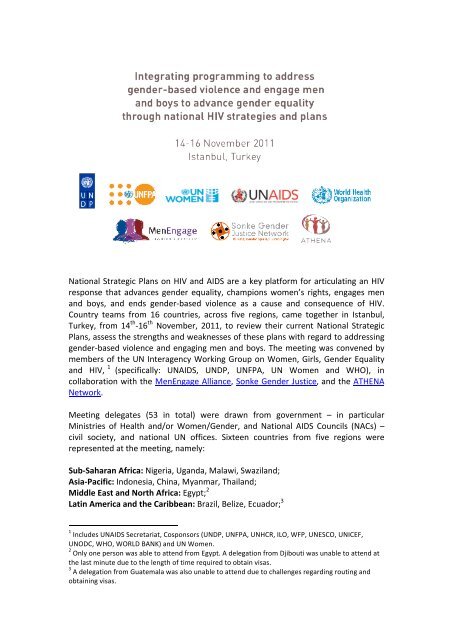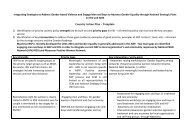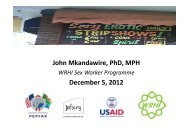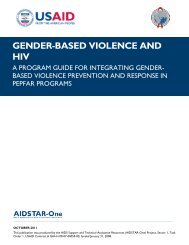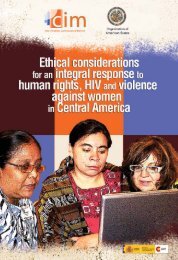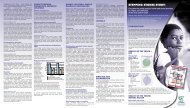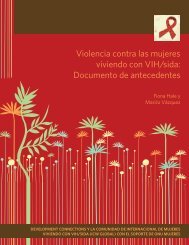The Executive Summary of this workshop can be ... - Salamander Trust
The Executive Summary of this workshop can be ... - Salamander Trust
The Executive Summary of this workshop can be ... - Salamander Trust
Create successful ePaper yourself
Turn your PDF publications into a flip-book with our unique Google optimized e-Paper software.
National Strategic Plans on HIV and AIDS are a key platform for articulating an HIV <br />
response that advances gender equality, champions women’s rights, engages men <br />
and boys, and ends gender-‐based violence as a cause and consequence <strong>of</strong> HIV. <br />
Country teams from 16 countries, across five regions, came together in Istanbul, <br />
Turkey, from 14 th -‐16 th Novem<strong>be</strong>r, 2011, to review their current National Strategic <br />
Plans, assess the strengths and weaknesses <strong>of</strong> these plans with regard to addressing <br />
gender-‐based violence and engaging men and boys. <strong>The</strong> meeting was convened by <br />
mem<strong>be</strong>rs <strong>of</strong> the UN Interagency Working Group on Women, Girls, Gender Equality <br />
and HIV, 1 (specifically: UNAIDS, UNDP, UNFPA, UN Women and WHO), in <br />
collaboration with the MenEngage Alliance, Sonke Gender Justice, and the ATHENA <br />
Network. <br />
Meeting delegates (53 in total) were drawn from government – in particular <br />
Ministries <strong>of</strong> Health and/or Women/Gender, and National AIDS Councils (NACs) – <br />
civil society, and national UN <strong>of</strong>fices. Sixteen countries from five regions were <br />
represented at the meeting, namely: <br />
Sub-‐Saharan Africa: Nigeria, Uganda, Malawi, Swaziland; <br />
Asia-‐Pacific: Indonesia, China, Myanmar, Thailand; <br />
Middle East and North Africa: Egypt; 2<br />
Latin America and the Carib<strong>be</strong>an: Brazil, Belize, Ecuador; 3<br />
1 Includes UNAIDS Secretariat, Cosponsors (UNDP, UNFPA, UNHCR, ILO, WFP, UNESCO, UNICEF, <br />
UNODC, WHO, WORLD BANK) and UN Women. <br />
2 Only one person was able to attend from Egypt. A delegation from Djibouti was unable to attend at <br />
the last minute due to the length <strong>of</strong> time required to obtain visas. <br />
3 A delegation from Guatemala was also unable to attend due to challenges regarding routing and <br />
obtaining visas.
Eastern Europe and Central Asia: Russia, Tajikistan, Kazakhstan, and Moldova. <br />
In addition, two delegates from a similar meeting in 2010 attended, in order to share <br />
lessons learnt and progress on country action plans from that meeting; Mr Dragan <br />
Ilic from the National AIDS Council in Serbia, and Dr Lillian Otiso from the Liverpool <br />
VCT Foundation in Kenya. <br />
<strong>The</strong> first day <strong>of</strong> the meeting focused on the question: Why integrate gender-‐based <br />
violence and engagement <strong>of</strong> men and boys as partners for gender equality into <br />
National Strategic Plans (NSPs)? Presenters and delegates explored the <br />
interconnections <strong>be</strong>tween HIV and gender based violence (both cause and effect) <br />
and the role <strong>of</strong> men and boys in both perpetrating and preventing gender-‐based <br />
violence, especially violence against women and girls. Country delegations then used <br />
a policy analysis tool to review their current or draft National Strategic Plans and <br />
identify gaps and priority issues to address. <br />
<strong>The</strong> second day <strong>of</strong> the meeting focused on the question: How to integrate gender-based<br />
violence and engagement <strong>of</strong> men and boys as partners for gender equality <br />
into National Strategic Plans (NSPs)? Participants were introduced to the Gender <br />
Road-‐map as a key recourse for ensuring that NSPs effectively integrate gender. <br />
Presentations were given by resource persons from bodies working on gender-‐based <br />
violence, including violence against sex workers (<strong>The</strong> European Network for HIV/STI <br />
Prevention and Health Promotion among Migrant Sex Workers – TAMPEP, UN <br />
Women: UN <strong>Trust</strong> Fund for Eliminating Violence Against Women, WHO; entities <br />
working with men and boys as partners for gender equality (Promundo, Sonke, <br />
COWLHA); and organisations working to promote the meaningful involvement <strong>of</strong> <br />
women living with HIV (UN Women, <strong>Salamander</strong> <strong>Trust</strong>). Seven women from among <br />
the participants <strong>of</strong> the meeting co-‐facilitated <strong>this</strong> session. <strong>The</strong> delegates then <br />
worked in country groups to develop country action plans for integrating attention <br />
to gender-‐based violence and working with men and boys as partners for gender <br />
equality into their NSPs. <br />
On the third (half) day <strong>of</strong> the meeting country action plans were finalised and shared, <br />
and the delegates explored both what they would need by way <strong>of</strong> resources and <br />
support in order to implement the plans, and what resources and support they could <br />
<strong>of</strong>fer, by way <strong>of</strong> experience, tools, skills, and materials. <strong>The</strong> meeting ended with an <br />
evaluation and a group photograph. <br />
Highlights and Outcomes <br />
Participants at the meeting expressed their satisfaction with the outcomes. <br />
Delegate evaluations indicated a high level <strong>of</strong> perceived usefulness at both the <br />
conceptual stages <strong>of</strong> the <strong>workshop</strong>, and the strategic planning stage. Participants <br />
were fully engaged throughout the three days. Multi-‐sectoral delegations, with <br />
delegates from government, National AIDS Councils, and Civil Society, created a <br />
dynamic environment for learning and exchange among and across the country <br />
delegations. Sessions with focused regional group-‐work also allowed for effective <br />
<br />
2
learning and lively exchange at the regional / international level. “I know from the <br />
Asia Pacific region that there was a lot <strong>of</strong> cross-‐learning and exchanges <strong>be</strong>tween <br />
participants from Myanmar and China and <strong>be</strong>tween Thailand and Indonesia for <br />
example. For starters, they intend to keep in touch and to share their experiences on <br />
implementing their country action plans.” (Coordinator Feedback) <br />
Each country used the tools provided to carry out a policy analysis <strong>of</strong> their relevant <br />
NSP and produced an action plan for immediate implementation. Delegate feedback <br />
indicated that the process <strong>of</strong> systematically analysing the NSPs was new and in some <br />
instances challenging, but that it also resulted in a greater level <strong>of</strong> engagement with <br />
NSPs. “<strong>The</strong> development <strong>of</strong> the Policy Analysis Tool prior to the meeting made a big <br />
difference to guiding several <strong>of</strong> the sessions and was invaluable in assisting <br />
participants to identify and think through specific, tangible interventions that could <br />
<strong>be</strong> included in their NSPs.” (Coordinator Feedback) Delegates discussed having the <br />
tool translated for broader in-‐country use, particularly in the context <strong>of</strong> the NSP <br />
process. Together with the Gender Roadmap and the Country Action Plan Template, <br />
<strong>this</strong> provided a full complement <strong>of</strong> content and process-‐based planning tools. <br />
Country Action Plans were detailed and grounded in the reality <strong>of</strong> what is actually <br />
happening in each <strong>of</strong> the countries. In three instances (Belize, Thailand, and <br />
Swaziland), new NSPs were in the process <strong>of</strong> <strong>be</strong>ing drafted and the country teams <br />
were able to craft the exact language they wanted to see inserted into the new Plans. <br />
“It has <strong>be</strong>en very valuable. For our group – Thailand – it was a good composition. <br />
Important point is that the persons responsible for both HIV/RH NSP have <strong>be</strong>en here. <br />
<strong>The</strong> other mem<strong>be</strong>rs are from NGOs – strong advocates. Very effective. Perfect.” <br />
(Participant Feedback) <br />
Additional highlights and key strengths <strong>of</strong> the <strong>workshop</strong> were identified as <br />
follows: 4<br />
1. <strong>The</strong> meeting was organized to facilitate peer-‐to-‐peer learning and <strong>this</strong> was <br />
highlighted as one <strong>of</strong> the key strengths <strong>of</strong> the <strong>workshop</strong>. <strong>The</strong> involvement <strong>of</strong> <br />
‘Returnee Delegates’ from Serbia and Kenya who had participated in the Nairobi <br />
consultation and were able to share their country’s experience in the follow-‐up to <br />
that consultation, which gave great credibility to the consultation. <br />
Peer-‐to-‐peer learning also took place through presentations <strong>of</strong> good practice and <br />
practical examples <strong>of</strong> programmes and strategies, with examples from COWLHA <br />
(Malawi), Sonke Gender Justice and through a film extract from Stepping Stones <br />
(Uganda). <br />
2. Intra-‐ and cross-‐regional group work was also felt to <strong>be</strong> very useful, and an <br />
illustration <strong>of</strong> why global <strong>workshop</strong>s that bring different countries and regions <br />
together have added value. “Two Chinese and Russian participants were comparing <br />
various cultural factors that would shape interventions working with men in <br />
4 Analysis drawn from delegates’ evaluations and coordinators’ feedback <br />
<br />
3
addressing GBV even on the way to the airport in the minivan!” (Coordinator <br />
Feedback) <br />
3. Integration <strong>of</strong> sex work and HIV issues: <strong>The</strong> involvement <strong>of</strong> the TAMPEP <br />
Association (a non-‐pr<strong>of</strong>it organization that aims to promote actions and policies that <br />
respect the rights <strong>of</strong> immigrants and immigrant sex workers) to give a sex worker <br />
rights programming perspective and technical support was highlighted by a num<strong>be</strong>r <br />
<strong>of</strong> participants and issues pertaining to sex worker rights were taken up in the <br />
Country Action Plan from Ecuador. “We are still very much in our knowledge base <br />
driven by a sub-‐Saharan Africa perspective and need good models <strong>of</strong> what is working <br />
for key vulnerable groups, particularly in concentrated epidemic settings.” <br />
(Coordinator Feedback) <br />
4. <strong>The</strong> session on the meaningful involvement <strong>of</strong> women living with HIV; the women <br />
living with HIV who co-‐facilitated the session provided regional insights and technical <br />
support to country delegations, and in particular shed light on the gendered <br />
dynamics <strong>of</strong> participation. Several delegations responded to these messages with <br />
positive inputs into their country action plans. <strong>The</strong> process enabled the translation <strong>of</strong> <br />
the consultation into an opportunity to also support the leadership <strong>of</strong> women living <br />
with HIV, community building, and networking. <br />
5. <strong>The</strong> development <strong>of</strong> a shared resources ‘pool’ in addition to a virtual archive and <br />
resource centre comprising all the presentations given at the <strong>workshop</strong> as well as <br />
many additional background documents, advocacy and policy tools, which is <br />
accessible to meeting participants through the <strong>be</strong>low URL. <strong>The</strong> contents (to date) <strong>of</strong> <br />
the virtual resources centre were also shared with participants through the <br />
distribution <strong>of</strong> CD-‐roms . <br />
http://www.salamandertrust.net/index.php/Projects/GBV_Workshop_Istanbul_Nov<br />
_2011/ <br />
<strong>The</strong> <strong>workshop</strong> was anchored in a participatory approach. As such, meeting <br />
participants were involved in reviews, strategy sessions, and closing remarks. This <br />
promoted peer-‐to-‐peer exchange and learning, provided motivating examples <strong>of</strong> <br />
success, and grounded the discussions in reality. In the evaluations, delegates <br />
consistently highlighted the usefulness and need for more peer exchange, discussion <br />
and learning, at national, regional and international level. <br />
Why <strong>this</strong> Meeting <br />
<strong>The</strong> UN Interagency Working Group on Women, Girls, Gender Equality and HIV, 5<br />
continues to work in partnership with the MenEngage Alliance, Sonke Gender Justice, <br />
and the ATHENA Network to organize multi-‐stakeholder consultations to address <br />
gender-‐based violence and engage men and boys for gender equality in the context <br />
<strong>of</strong> HIV. This second consultation builds on the first consultation, “Nairobi Meeting on <br />
Integrating Strategies to Prevent Gender-‐based Violence and Engage Men and Boys <br />
5 Includes UNAIDS Secretariat, Cosponsors (UNDP, UNFPA, UNHCR, ILO, WFP, UNESCO, UNICEF, UNODC, WHO, <br />
WORLD BANK) and UN Women. <br />
<br />
4
to Achieve Gender Equality through National Strategic Plans on HIV and AIDS,” which <br />
was held in Decem<strong>be</strong>r 2010 in Nairobi, Kenya. <strong>The</strong> Nairobi meeting was organized to <br />
respond to the commitments outlined in the UNAIDS Agenda for Accelerated Action <br />
for Women, Girls, Gender Equality and HIV and the UNAIDS Strategy “Getting to <br />
Zero.” It focused on facilitating more successful integration <strong>of</strong> gender-‐based violence <br />
and the engagement <strong>of</strong> men and boys for gender equality into countries’ National <br />
Strategic Plans on HIV and AIDS and other relevant national policies. <strong>The</strong> Nairobi and <br />
Istanbul meetings form part <strong>of</strong> growing efforts to address the intersections <strong>of</strong> gender <br />
equality and HIV, including: championing women’s rights in the context <strong>of</strong> HIV and <br />
AIDS, addressing the HIV needs <strong>of</strong> women and girls, enhancing efforts to integrate a <br />
focus on gender-‐based violence as a cause and consequence <strong>of</strong> HIV into HIV <br />
responses, and actively engaging men and boys in achieving gender equality to <br />
challenge constructions <strong>of</strong> masculinities that exacerbate the spread and impact <strong>of</strong> <br />
HIV and AIDS. <br />
<br />
5


